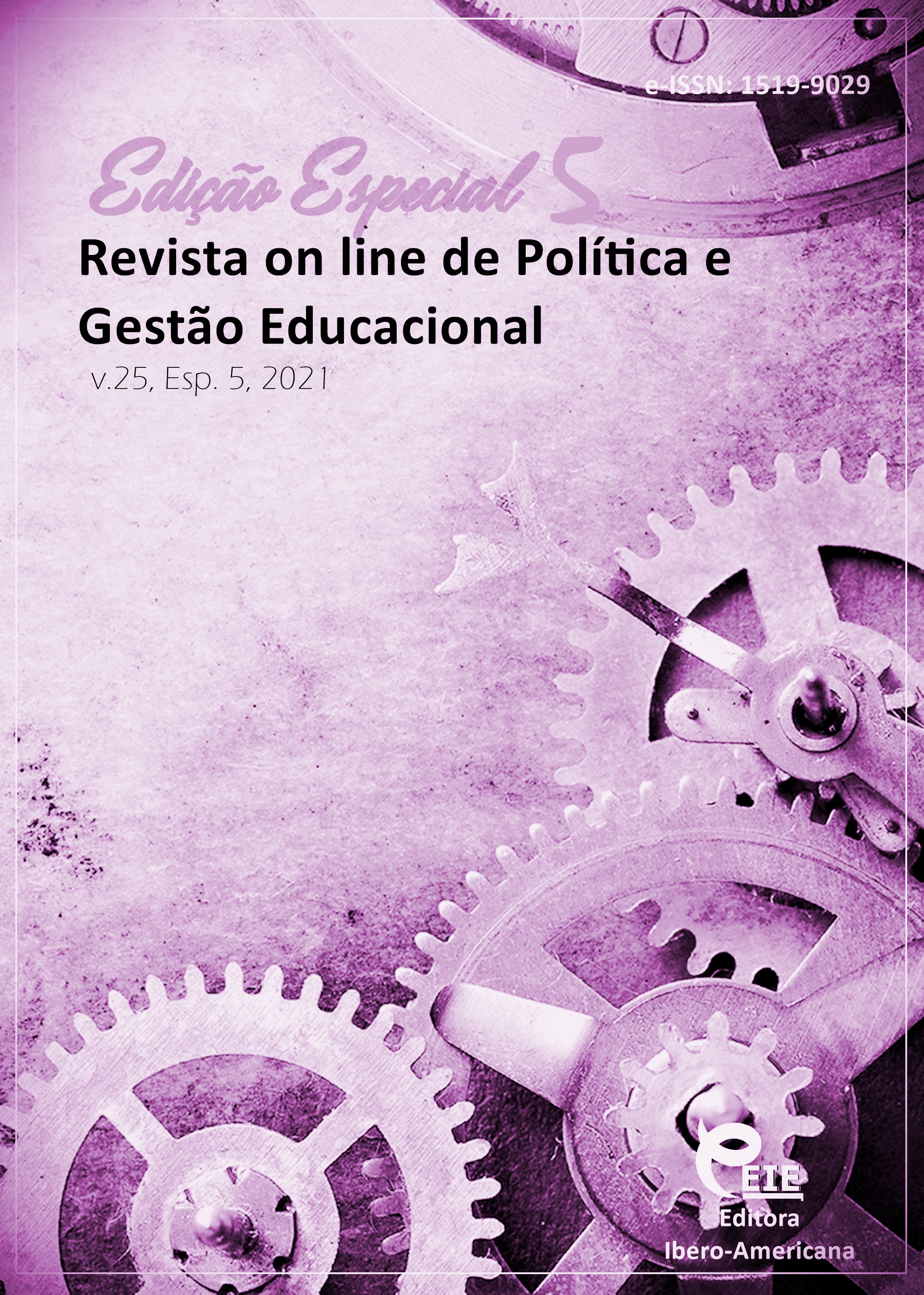Modern pedagogical education in the conditions of blended learning
Foreign experience
DOI:
https://doi.org/10.22633/rpge.v25iesp.5.16042Keywords:
Pedagogical education, Blended learning, Distance technologies, InternationalizationAbstract
The present study is theoretical and aims to explore and critically evaluate the experience of blended learning demonstrated by countries that have attained a high level of education. Using a complex of theoretical methods, the study provides an analysis of the concept of blended learning, which combines both the traditional forms of education, the methods of distance learning, and innovative e-learning technologies. The models of blended learning found to be most successful in practical implementation are analyzed. The provided examples and recommendations for organizing blended learning in pedagogical education in foreign countries and a discussion of the challenges of its implementation and the possibilities of overcoming them can be useful in the use of blended learning in the Russian system of education, considering the domestic specifics. The study results suggest that the effectiveness of pedagogical education can be ensured by means of a combined implementation of different forms of e-learning and traditional learning – through blended learning.
Downloads
References
ABRAMOVA, Y. K. Blended learning as an innovative educational technology. Prospects for the development of information technologies, v. 17, p. 115-119, 2014.
ALAMMARY, A.; SHEARD, G.; CARBONE, A. Blended learning in higher education: three different approaches. Australasian Journal of Educational Technologies, v. 30, n. 4, p. 440-454, 2014.
BARBER, M.; MURSHED, M. How to achieve a consistently high quality of education in schools. Lessons from the analysis of the best school education systems in the world. Questions of Education, v. 3, p. 7-60, 2008.
BIELAWSKI, L.; METCALF, D. Blended eLearning: integrating knowledge, performance, support and online learning. Amherst: HRD Press, 2003.
BOGORYAD, N. V.; LYSUNETS, T. B. Changing the role of the teacher in the concept of mixed learning. In the world of scientific discoveries, v. 3, n. 51, p. 76-81, 2014.
BORISENKOV, V. P. Quality of education and problems of training of pedagogical personnel. Education and science, v. 3, n. 122, p. 4-18, 2015.
CLARC, D. Blended learning: an EIC White Paper. Brighton: Epic Group, 2003. p. 23.
DUDNEY, G.; HOCKLY, N. How to teach English with technology. Harlow: Pearson Education, 2007.
EL-MOWAFY, A.; KUHN, M.; SNOW, T. Blended learning in higher education: current and future challenges in surveying education. Issues in Educational Research, v. 23, n. 2, p. 132-150, 2013.
GOSUDAREV, I. B. On the issue of the terminology of e-learning. Human and education, v. 1, n. 42, p. 180-183, 2015.
GRACHEVA, L. Y. et al. Models and practices of professional development of teachers in foreign educational systems. Education and Science, v. 22, n. 6, p. 176-200, 2020.
INTERFAX EDUCATION. Distance learning in extreme conditions. 2020. Disponível em: https://academia.interfax.ru/ru/analytics/research/4491/. Acesso em: 10 set. 2021.
IVANOV, O. B.; IVANOVA, S. V. Formation of the educational environment: an interdisciplinary view. Philosophical Sciences, v. 1, p. 39-49, 2016.
KLEYMENOV, I. S. Practice of pedagogical education and professional development of personnel in Finland and Sweden. In: Government and law, economics and education: a youth perspective. Materials of the All-Russian student scientific and practical conference of students, undergraduates and postgraduates. Tula: Tula State University, 2019. p. 250-253.
LEGAN, M. V.; YATSEVICH, T. A. Combined model of student learning based on the distance learning system. Higher education in Russia, v. 4, p. 136-144, 2014.
MATVEEVA, E. F. Modern world trends in the system of training and advanced training of teachers in Hong Kong. Professional education in Russia and abroad, v. 2, n. 26, p. 175-180, 2017.
MEANS, B. et al. Evaluation of evidence-based practices in online learning: a meta-analysis and review of online learning studies. U.S. Department of Education, 2010.
MIJARES, I. Blended learning: are we getting the best from both worlds? Literature Review for EDST 561, 2012. DOI: http://dx.doi.org/10.14288/1.0075749
MULLER, D. The Tyranny of indicators: how the obsession with numbers threatens education, healthcare, business and power. Transl. from English. Moscow: Alpina pablisher, 2019. 266p.
POLLOCK, W. H.; JEFFERSON, A. M. Six disciplines of breakthrough training. How to turn training and development into business results. Transl. from English by Gorman, A. Moscow: Eksmo, 2019. 352p.
RICHARDS, G. Learning analitics: on the way to smart education. Moscow, October 8, 2012. Disponível em: https://slideplayer.com/slide/3740970. Acesso em: 10 set. 2020.
SHIRSHOVA, I. A. Preparation of a modern teacher: the experience of Finland in the field of pedagogical education. Scientific notes of the Tavrichesky National University named after V. I. Vernadsky. Series "Problems of pedagogy of secondary and higher schools", v. 4, p. 26-35, 2014.
SHITOVA, V. A. Problems of implementing distance learning technologies in the educational process of higher education. Bulletin of the Moscow State Regional University, v. 4, p. 57-64, 2011.
TAGUNOVA, I. A. et al. Modern pedagogical comparative studies: role, functions, and factors of development. Moscow: Novoye vremya, 2019. 208p.
ZHELNOVA, E. V. 8 stages of mixed learning: review of the article "Missed Steps" by Darlene Painter, Training & Development. 2018. Disponível em: http://www.obs.ru/interest/publ/?thread=57. Acesso em: 10 set. 2021.
Published
How to Cite
Issue
Section
License
Copyright (c) 2021 Revista on line de Política e Gestão Educacional

This work is licensed under a Creative Commons Attribution-NonCommercial-ShareAlike 4.0 International License.
Manuscritos aceitos e publicados são de propriedade da Revista on line de Política e Gestão Educacional. É vedada a submissão integral ou parcial do manuscrito a qualquer outro periódico. A responsabilidade do conteúdo dos artigos é exclusiva dos autores. É vedada a tradução para outro idioma sem a autorização escrita do Editor ouvida a Comissão Editorial Científica.











